Socially responsible shopping or investing — it’s an awkward term for an idea as old as Earth Day. Many Lutherans practice it consciously while others ask, “Is that a thing?”
In your personal or congregational life do you:
Buy fairly traded coffee, chocolate or olive oil?
Bring reusable bags to the grocery store?
Request that your pension be invested in “social purpose” funds?
Avoid buying clothing made in sweatshops?
If yes, then you are doing it — that socially responsible thing.
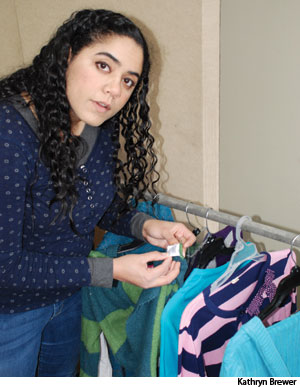
“I have a list in my head of stores and companies that treat their employees well, that recycle, use resources wisely and exhibit ethical practices,” says Vanessa Young of St. Paul Lutheran Church, Wheaton, Ill. She checks labels using www.responsibleshopper.org, www.buypartisan.org and www.hrc.org/apps/buyersguide.
“I try to really think about whether or not I need that new article of clothing or that new piece of technology,” said Elly McHan, a campus pastor at Concordia College, Moorhead, Minn. “There’s privilege involved in that I have the financial ability and time to think about where I shop; to pay attention to packaging and how far the food has traveled; and whether a less-packaged, more local option might suffice.”
To Lura Groen, pastor of Grace Lutheran Church, Houston, “it’s about how we can ‘love our neighbors as ourselves’ with the things we buy. Is my neighbor helped or harmed by what I buy? And then I take into account the neighbors who make the product, the neighbors around where the product is made, all my neighbors on the earth, and the way I’ll be a better or worse person to my neighbors when I use this product.”
Vanessa Young is director of youth and family ministry at St. Paul Lutheran, Wheaton, Ill., where the earth ministry team encourages members to “bring a bowl” for soup suppers and use the church’s cloth napkins to avoid buying disposable products. The youth also use reusable bowls and cups for their weekly activities.
Young also suggests shopping options for her sisters and friends. “They know I have a list in my head of stores and companies that treat their employees well, that recycle, use resources wisely and exhibit ethical practices,” she said, adding, “A dollar spent is a vote cast” for the earth and the human family.
Young believes people want to know how to be responsible consumers. “They will go out of their way if you make it very easy for them,” she said, noting that word about corporate practices spreads fast on social media.
Fair trade products are often a starting point for ELCA congregations. These products assure that small-scale farmers are given a fair and dependable price for their goods (coffee, chocolate, olive oil and others) on the world market.
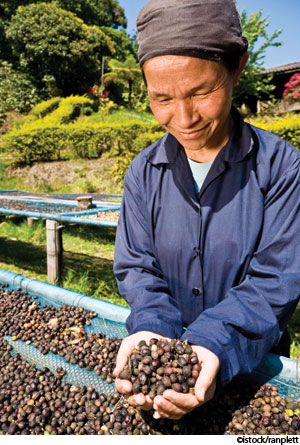
At First Lutheran Church, Little Falls, Minn., the hospitality crew serves fair trade coffee and tea to about 250 worshipers each week. Susan Gustner, office manager and lay visitation coordinator, said, “We also have the products available for purchase at cost. We believe it is important to support our brothers and sisters in developing countries in this way.”
Is being “socially responsible” a thing? “Absolutely!” Gustner said. “Anything a person does will have an impact. … If we don’t believe that our world will suffer for it. Our neighbors aren’t just the people in the next house over but [people] on the other side of the world. God calls us to care for one another and for creation.”
When serving only fair trade coffee was suggested, there was no real resistance. Some members even contribute to a fund for buying fair trade products.
“Our members are supportive of giving a hand to people around the globe. Some have gone on mission trips and see buying fair trade as something they can do on a daily basis,” Gustner said. “We all buy coffee anyway — why not be helping a small farmer while we do it?
“We spend a little more, but it is something we think is worth doing as a mission.”
The women of St. Paul Lutheran Church in Aberdeen, Md., have their own kiosk on wheels. Made by two men of the congregation, the kiosk goes wherever fair trade items can be displayed — in the narthex on a Sunday morning or in the fellowship hall for a special event.
Lutheran World Relief is an important ELCA partner in making fair trade products available to congregations. The organization cites Martin Luther’s explanation to the Seventh Commandment: “We should fear and love God that we may … help [our neighbor] to improve and protect his property and business.”
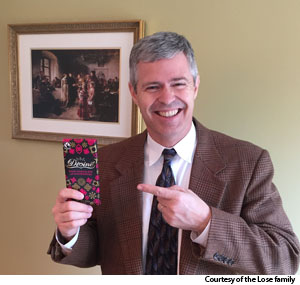
“I don’t think I’ll ever eat chocolate that doesn’t have the fair trade label on it again,” says ELCA pastor David Lose, president of the Lutheran Theological Seminary at Philadelphia.
During a trip to Honduras, David Lose, president of the Lutheran Theological Seminary at Philadelphia, wrote in a blog: “Knowing a little more about where chocolate comes from and the farmers who work so hard to produce it, as well as seeing firsthand the difference it makes to buy fair trade, I don’t think I’ll ever eat chocolate that doesn’t have the fair trade label on it again.
“Typically farmers receive about 4 cents for every dollar you and I pay for a chocolate bar. Fair trade groups … are able to raise this to 6 to 7 cents on the dollar. While that is still a small amount, that additional 50 percent or more makes an incredible difference to farmers.”
Immanuel Lutheran Church, Seattle, combines a monthly “Fair Trade Marketplace” with an “Advocacy Day,” said member Stacy Kitahata. In addition to fair trade chocolate and Palestinian olive oil and soap, the market sells art cards made by a member to benefit the church’s community services.
“Immanuel Fair Trade Marketplace demonstrates our congregation’s commitment to economies that invest in local people and communities,” Kitahata said. The proceeds support Immanuel’s Community Services hygiene center, recovery program and food ministries.
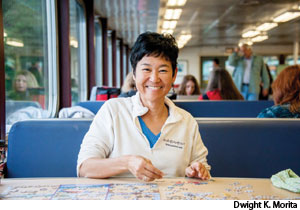
Stacy Kitahata appreciates that her congregation, Immanuel Lutheran, Seattle, combines advocacy efforts with a monthly “Fair Trade Marketplace” that includes Palestinian olive oil and soap, as well as original art cards that benefit community services.
Nativity Lutheran Church in Reading, Pa., serves fair trade coffee for social occasions, and its women’s group sells fairly traded Divine Chocolate at cost, said Eileen Smith LeVan, its pastor.
LeVan, who encourages members to give ELCA Good Gifts, was delighted when “at Christmas our members ‘gifted’ me [with] a microloan for women in developing countries and support for a program for pregnant teens.”
Part of her role as a pastor, she said, is to encourage parishioners to consider the impact of their spending. She doesn’t stop there. LeVan’s entire ELCA pension is invested in social purpose funds through Portico Benefit Services, which manages the church’s retirement program. Twenty-nine percent of all ELCA retirement dollars are in these funds.
“I know [the funds] have been scrutinized to include companies that are environmentally responsible and don’t exploit workers,” she said. “I know my money will be invested in ways compatible with my values.”
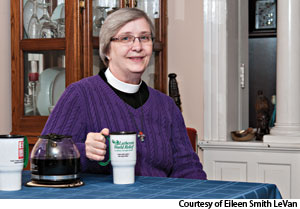
Eileen Smith LeVan, pastor of Nativity Lutheran, Reading, Pa., enjoys her congregation’s fair trade coffee and invests her entire ELCA retirement account in social purpose funds through Portico Benefit Services. “I know my money will be invested in ways compatible with my values,” she says.
Investing with purpose
The eight social purpose funds strive to invest in ways consistent with the values of the ELCA. Portico screens thousands of potential companies and typically finds about 10 percent to be unsuitable based on screening out alcohol, environmental issues, gambling, military weapons, pornography and tobacco. In 2014 the ELCA Church Council approved a new screen for privately owned prisons.
In addition to screened funds, Portico works with expert partners to invest in community development, affordable housing, sustainable forestry, clean energy options, and women- and minority-owned businesses.
“As one called to preach the gospel, including justice, concern for the neighbor and caring for the common good, where my pension funds were invested was a faith issue and not simply a financial question,” said Luther Wayne Kendrick, a retired ELCA pastor in Comstock, Wis.
“I gladly invested my funds in those socially responsible options. I saw it as faithfulness and common sense. The returns of these socially responsible funds were nearly identical to the unscreened funds in the plan [and sometimes higher], so there was no financial downside.”
The New Jersey Synod’s investment committee decided to adopt the ELCA’s social screens. “Our financial managers investigate funds or companies that fit within these restrictions,” said Tom Kull, a former synod treasurer. Some managers have turned down the synod’s business, saying it would be too much work, he added.
Care for the environment is often a strong motivator for socially responsible consumption — though sometimes the convenience of prepackaged snacks like applesauce or yogurt in a plastic tube just makes life easier for parents.
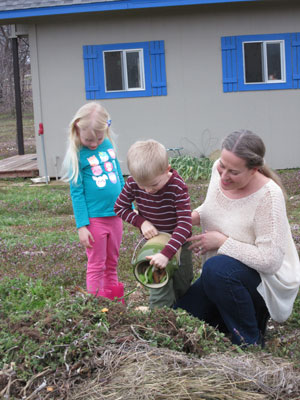
Kathleen Bronstad, a member of Messiah Lutheran Church in Weatherford, Texas, buys green products, recycles and composts with her kids.
“Yes, socially responsible consumerism is relevant in my life,” said Kathleen Bronstad, a member of Messiah Lutheran Church, Weatherford, Texas. She faces the tensions of other young parents when it comes to green living. “I buy in bulk and send the kids to school with reusable containers that I wash each night,” she said. “I’m not sure it’s actually worth it as the containers probably use more plastic than a bunch of baggies.
“I think about this a lot. Am I really helping the environment with my actions? We recycle everything we can in this household and we have a compost pile. I use a drip hose watering system.”
Human rights issues and the “huge, negative impact on the environment” were among the reasons Bronstad avoided buying products from China for a long time.
McHan from Concordia echoes that concern: “With my deep connection to Palestine, I try very hard to know what is coming from [Israeli] illegal settlements, and not to purchase products related to them.”
Congregational purchases too
When First English Lutheran, Columbus, Ohio, replaced the church’s 50-year-old heating system, it went high-efficiency with help from an ELCA Mission Investment Fund grant. The congregation’s Green Team, headed by Sara Ward, is committed to tracking and reducing the church’s energy and gas usage and carbon footprint.
“As people of faith, we know we are called to do justice for all, which includes that we be intentional in our care of our natural world,” Ward said. “How we use these gifts not only matters to our local ministry but also to countless others around the globe struggling to survive in an ever-more-hostile climate. It is incumbent upon us to do our part to reduce this burden in every way possible and hopefully lead others to do likewise.”
Jim Martin-Schramm, a religion professor at Luther College, Decorah, Iowa, and others are organizing to present a resolution related to fossil fuels at ELCA synod assemblies. The resolution will ask ELCA congregations and institutions to make a public commitment to transition away from investments in fossil fuels and move to investments in clean, renewable energy sources.
Martin-Schramm believes Christians are called to socially responsible living based on his understanding of a Christian’s one vocation as “the care and redemption of all that God has made.”
That “applies to every aspect of life: how I am at work, with my family, in my marriage, as a member of my church,” he said. “How I steward resources, how I function as a citizen all are grounded in this one vocation. We are stewards of the gifts given to us, with lots of room for novelty and creativity.”
Socially responsible indeed.
Before you buy
Before making a purchase, ask: Why do I want to make the purchase? Do I need the item? Does this purchase reflect the values I hold and the life I want to live? Does it support the well-being of others?
Consider purchasing items secondhand. Garage sales and thrift stores conserve resources, support local communities and prevent usable items from ending up in landfills.
When you buy new items, purchase them from companies with positive labor and environmental practices. (Learn more at www.buypartisan.com and www.responsibleshopper.org.)
Purchase fair trade products from small farmers across the globe. (Visit www.lwrcoffee.com for ideas.)
Choose alternative gifts: the gift of your skill, a donation in someone’s honor or a membership to a local museum. (See www.elca.org/goodgifts and www.buynothingchristmas.org/alternatives.)



